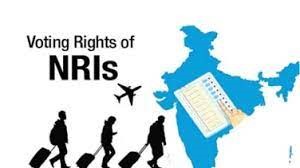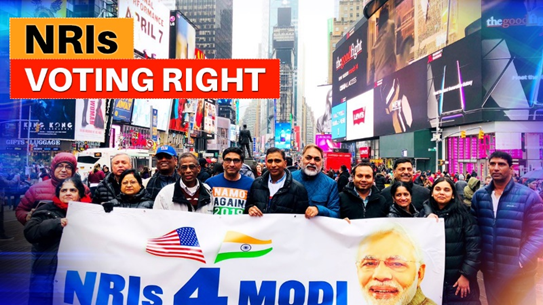- Courses
- GS Full Course 1 Year
- GS Full Course 2 Year
- GS Full Course 3 Year
- GS Full Course Till Selection
- Answer Alpha: Mains 2025 Mentorship
- MEP (Mains Enrichment Programme) Data, Facts
- Essay Target – 150+ Marks
- Online Program
- GS Recorded Course
- Polity
- Geography
- Economy
- Ancient, Medieval and Art & Culture AMAC
- Modern India, Post Independence & World History
- Environment
- Governance
- Science & Technology
- International Relations and Internal Security
- Disaster Management
- Ethics
- NCERT Current Affairs
- Indian Society and Social Issue
- NCERT- Science and Technology
- NCERT - Geography
- NCERT - Ancient History
- NCERT- World History
- NCERT Modern History
- CSAT
- 5 LAYERED ARJUNA Mentorship
- Public Administration Optional
- ABOUT US
- OUR TOPPERS
- TEST SERIES
- FREE STUDY MATERIAL
- VIDEOS
- CONTACT US
Postal Ballot System for NRI
Postal Ballot System for NRI
12-06-2023


Latest Context
Recently, the Chief Election Commissioner laid emphasis on the necessity to facilitate postal voting for Non-Resident Indians (NRIs). In its proposal, Election Commission forwarded the Electronically Transmitted Postal Ballots (ETPBs) for NRIs that are currently awaiting government approval. Its objective is to provide an opportunity to over 1.34 crore overseas Indians for participating in elections by using a technology-driven methodology.
Electronically Transmitted Postal Ballot System
- Introduction: It is designed to promote remote voting for individuals who are unable to cast their votes in person at a polling station. It uses electronic transmission and postal services in order to make voters capable to receive and return their ballots electronically.
- For Service Voters
- Under this system, postal ballots are sent to registered service voters electronically. Then these ETPB (along with a declaration form and covers) are downloaded by the service voter and registers their mandate on the ballot and send it to the returning officer of the constituency via ordinary mail.
- It will also comprise an attested declaration form (signed by the voter in the presence of an appointed senior officer who will attest it). To allow service voters to use the ETPBS, the Conduct of Election Rules, 1961 was amended in 2016.
Election Commission’s Proposal Regarding ETPB for NRIs
- An amendment in Section 60 of the Representation of the People Act, 1951 was proposed by the Election Commission (EC) in order to forward the facility of ETPB to overseas electors in 2015.
- In 2020, the law ministry was informed by the EC that it is ready to implement this proposal technically and administratively.
- According to the EC, ETPBS can be used for NRIs with some modifications like permitting them to download their ballot papers online and return them by post or courier within a specified time limit.
- Election Commission also permitted the NRIs to appoint a proxy voter in India, who, after verifying their identity and consent, can cast their vote on their behalf.
- Under this proposal, the EC helped NRIs by providing them with an option to cast their vote at designated polling stations set up at Indian missions abroad where they can use electronic voting machines (EVMs) or paper ballots.
- As far as the status of this proposal is concerned, still it is pending with the law ministry. It is met with high opposition due to concerns over the security and authenticity of postal ballots.

Challenges Related to ETPB for NRIs
- Eligibility and Verification: To participate in remote voting consists of a highly complex procedure because it consists of questions concerning the determining of the eligibility of NRIs. This procedure will contain establishing accurate and reliable mechanisms to verify the identity, residency status, and eligibility conditions of NRIs for maintaining the integrity of the electoral process.
- Time Constraint and Postal Delay: Within a stipulated time frame after receiving it electronically, voters are required to send the postal ballot. But due to postal delays or logistical issues in some countries, there may be postal delays that may prevent the ballot from reaching the returning officer on time and that may cause disenfranchisement of some voters.
- Secrecy and Security: Since it comprises the transmission of sensitive electoral data via electronic means that could pose a risk of tampering, hacking, and interception by malicious actors. Furthermore, they may not secure the secrecy of the vote because of their subjectivity to scrutiny or coercion by others.
- Legal and Technical Challenges: It needs amendments to the Representation of the People Act, 1950 and 1951 in addition to the Conduct of Election Rules, 1961, to make overseas electors capable of voting through this system. Additionally, it needs robust technical infrastructure and coordination among various stakeholders like the Ministry of External Affairs, the Election Commission, the postal department and the embassies.
Non-Resident Indians (NRIs)
- Concept: NRIs are Indian citizens who are residing in foreign countries for employment, education or any other purpose. As per the Ministry of External Affairs, approximately 1.34 crore NRIs across 208 countries as of December 2020 are living. They are eligible to vote in Indian elections if they are registered as overseas electors in their respective constituencies in India.
Criteria for NRI: A person is considered NRI if:
- For 182 days or more during the financial year, She/he is not in India Or;
- If She/he is in India for less than 365 days during the 4 years preceding that year and less than 60 days in that year.

Q. ‘Indian diaspora has a decisive role to play in the politics and economy of America and European Countries. Comment with examples. (2020)



